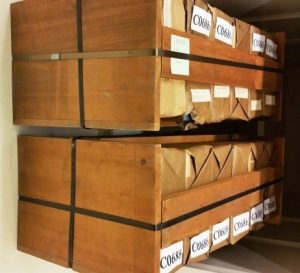The unsealing of TS Eliot’s letters to Emily Hale, December 2019
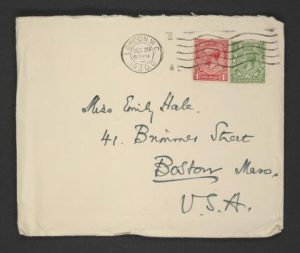 Prior to their release next month, the Princeton University Library has published a fascinating article about the unsealing of TS Eliot’s letters to Emily Hale.
Prior to their release next month, the Princeton University Library has published a fascinating article about the unsealing of TS Eliot’s letters to Emily Hale.
“Before a small audience… the Princeton librarians Don Skemer [who has since retired] and John Logan stood behind a table full of wooden crates wielding dual pairs of tin snips. They proceeded in tandem to snap the copper bands holding the crates and the wooden slats clattered to the table.
“Revealed at last were the letter boxes that held the answers to one of the most intriguing mysteries of modernism: Princeton’s trove of more than a thousand letters sent by TS Eliot to Emily Hale between 1930 and 1956.”
Nearly half of the letters, the article reveals, were discovered to still be folded inside of their corresponding envelopes. All of the letters were rehoused with their envelopes and arranged in chronological order, and then sent to the Digital Imaging Studio for imaging. The resulting digital surrogates will allow multiple researchers to use the collection at once, and will facilitate increased access to the collection, which will finally be opened to researchers next month following the end of its moratorium.
The article is here.
———————————————————————————————————-
From Old Possum’s Book of Practical Cats, to Cats, December 2019
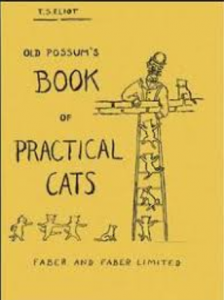 Among the many articles and reviews published to coincide with the opening of the movie Cats, Jia Tolentino in The New Yorker magazine explores The Improbable Insanity of Cats, “how Andrew Lloyd Webber and a team of collaborators turned a strange book by T S Eliot into a baffling cultural phenomenon.” The article includes some interesting observations on the nickname, Old Possum.
Among the many articles and reviews published to coincide with the opening of the movie Cats, Jia Tolentino in The New Yorker magazine explores The Improbable Insanity of Cats, “how Andrew Lloyd Webber and a team of collaborators turned a strange book by T S Eliot into a baffling cultural phenomenon.” The article includes some interesting observations on the nickname, Old Possum.
Despite largely negative reviews of the movie, the spokesperson for the TS Eliot Estate told The Guardian that “I think he would have had a sense of humour about it, he was very open-minded, he liked having his head blown. He was an unusual person and this is such an unusual thing.”
———————————————————————————————————-
TS Eliot and Beethoven, December 2019
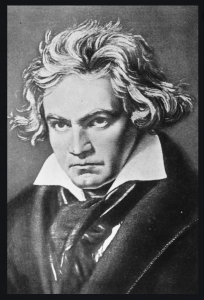 A new audio essay/documentary explores the significance of Beethoven to TS Eliot, particularly in his poetry written around WWII.
A new audio essay/documentary explores the significance of Beethoven to TS Eliot, particularly in his poetry written around WWII.
It suggests that the composer represented “resistance and a kind of redemption” to Eliot. It traces connections to Beethoven in Eliot’s work, and ways in which Beethoven’s music was significant in St Louis, and may have provided Eliot with “nostalgia for a place in which music was not nationalistic…was not rooted in one nation.”
Narrated by Aakanksha Virkar Yates of the University of Brighton, it features contributions from Christopher Ricks, John Xiros Cooper and Frances Dickey. The podcast, from Assay: The Journal of Nonfiction Studies; is available for listening here via Tried and True .
UPDATE: Those interested in the relationship between TS Eliot and Beethoven may be interested in an event combining a reading of Four Quartets by Jeremy Irons with a performance of Beethoven’s Quartet in A minor Op 132 – see the Events page for details.
———————————————————————————————————-
TS Eliot and The London Library, December 2019
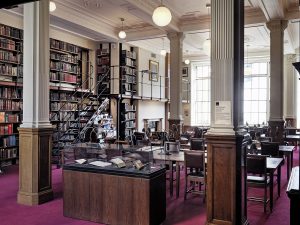 An article on the website of the TS Eliot Foundation explores the relationship between TS Eliot and The London Library.
An article on the website of the TS Eliot Foundation explores the relationship between TS Eliot and The London Library.
Eliot joined The London Library in 1918. He would remain an active member for the rest of his life, serving as President from 1952 until his death in 1965
“The air of productive calm (set off against the bustle of central London), combined with the ability to ‘take ten volumes home with me’ from the open shelving meant that for Eliot, ‘without the London Library, many of my early essays could never have been written’. Eliot recognised it as a place that fires the imagination and cultivates the soul, a place of curious books and even more curious people.”
The article can be read here.
———————————————————————————————————-
TS Eliot: The Search for Happiness, December 2019
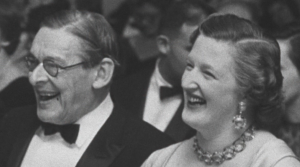 Sky Arts will broadcast a new documentary on TS Eliot on Sunday 15th December.
Sky Arts will broadcast a new documentary on TS Eliot on Sunday 15th December.
T.S. Eliot The Search for Happiness is both an exploration of Eliot’s life as a poet, playwright, essayist and critic and an examination of Eliot’s personal and spiritual journey.
“It was late in life that Eliot himself found happiness, when at the age of 68 he secretly married his secretary Valerie Fletcher, a woman thirty-eight years younger than himself,” says the programme’s publicity.
“The marriage offered Eliot a deep and extraordinary happiness. Eliot was lifted from his loneliness; he had a social life for the first time; Eliot and Valerie travelled extensively together, they loved each other’s company, and they went to the theatre.”
Contributors to the documentary include Robert McCrum, Lyndall Gordon, Jason Harding, Bill Goldstein, Hannah Sullivan, Andrew Lloyd-Webber, Trevor Nunn and Sarah Kennedy.
“T.S. Eliot The Search for Happiness is a portrayal of how a man found happiness late in life”. A trailer for the documentary is here.
———————————————————————————————————-
TS Eliot in BBC Radio 4’s The Poetry Editor, December 2019
As both an edited poet and a poetry editor,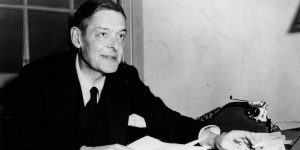 TS Eliot is a prominent presence in a BBC Radio 4 programme, The Poetry Editor.
TS Eliot is a prominent presence in a BBC Radio 4 programme, The Poetry Editor.
Presented by Hannah Sullivan, herself a TS Eliot Prize-winning poet, the programme begins by considering Pound’s editing of The Waste Land, with Matthew Hollis, the Faber Poetry Editor who now works at Eliot’s old desk. It considers the role played by poetry editors on the work of Eliot and others. The programme can be heard on BBC Sounds here.
———————————————————————————————————-
Exchanges, our Society quarterly, November 2019

The Autumn issue of our Society quarterly has now been published.
There are articles on acquiring Eliot’s autograph; a report from a Modernist evening in Virginia Woolf’s garden; an Eliot journey, leading to Emily Hale; and a new approach to My Favourite Eliot.
Download and read the new issue of Exchanges here.
———————————————————————————————————-
BBC Radio 4’s Thought For The Day, with TS Eliot, November 2019
 On November 8th, former Bishop Richard Harries gave BBC Radio 4’s Thought For The Day, exploring “a fundamental question” asked by TS Eliot.
On November 8th, former Bishop Richard Harries gave BBC Radio 4’s Thought For The Day, exploring “a fundamental question” asked by TS Eliot.
Harries asks “a question that that TS Eliot wrestled with all through the 1930s”, that being, “What is our understanding of a good society?”
He explains that the signing of the Munich agreement left Eliot “with a fundamental doubt about the validity of our whole civilisation”. Harries goes on to consider Eliot’s notion of “virtue”, and its role in public life.
You can hear the three minute item here.
———————————————————————————————————-
A Hundred Years of TS Eliot’s Tradition and the Individual Talent, October 2019
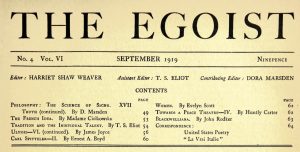 An article in the New Yorker magazine marks the centenary of the publication of arguably TS Eliot’s most influential literary essay.
An article in the New Yorker magazine marks the centenary of the publication of arguably TS Eliot’s most influential literary essay.
Kevin Dettmar, a Professor of English and director of the Humanities Studio at Pomona College, explores the history and significance of Tradition and the Individual Talent, which was first published over two issues in The Egoist magazine in the autumn of 1919.
“Fifty years after the death of the author was announced,” he writes, “and a century after Eliot’s belated obituary for Romanticism, Tradition still pulses with energy and life, what the poststructuralists would have called jouissance. Whether the influence is direct or indirect—whether a given literary essay has been influenced by Eliot’s critical brio, or by one who has been influenced by it—literary criticism today everywhere bears his impress.” The article is here.
———————————————————————————————————-
Book Of The Week, Young Eliot, October 2019
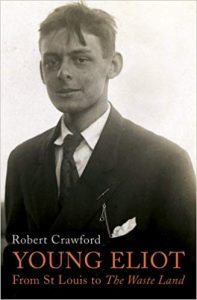 The BBC Radio 4 Book Of The Week recording of Young Eliot, the authorised biography by Robert Crawford of the first half of TS Eliot’s life, is being repeated on BBC Radio 4 Extra.
The BBC Radio 4 Book Of The Week recording of Young Eliot, the authorised biography by Robert Crawford of the first half of TS Eliot’s life, is being repeated on BBC Radio 4 Extra.
First broadcast on BBC Radio 4 in February 2015, the readers are Tom Mannion and David Acton. The repeat broadcasts are during week commencing 21st October, or you can listen to them online here.
Members may be interested in a significant discount on a hardback edition of Young Eliot; details in the Members Area.
———————————————————————————————————-
TS Eliot’s mantelpiece love letters, October 2019
 A profile of author Edna O’Brien by Ian Parker, in the New Yorker magazine, ends with revelations about the love life of TS and Valerie Eliot.
A profile of author Edna O’Brien by Ian Parker, in the New Yorker magazine, ends with revelations about the love life of TS and Valerie Eliot.
At the conclusion of the article, Edna O’Brien meets with Clare Reihill, Director of the TS Eliot Foundation. Parker writes that ‘Reihill, who had been a friend of Valerie Eliot’s, told O’Brien a story of devotion: sometimes, on a Sunday afternoon, T. S. Eliot “would put a letter on the mantelpiece, addressed to ‘Mrs. T. S. Eliot.’ And it would be an erotic letter about their life together.”
‘Decades later, Reihill said, Valerie still treasured these communications. “Once, when she was quite ill…she took some of the letters to put under her pillow, and I had to sit and read them to her in the evening.
“I was slightly embarrassed, because they were . . . intimate. But they were beautiful.”’
The article also mentions the couple’s “family edition” of The Waste Land, whose inscription starts: “This book belongs to Valerie and so does Thomas Stearns Eliot, her husband.”
———————————————————————————————————-
“TS Eliot’s other woman” – Emily Hale, by Lyndall Gordon, October 2019
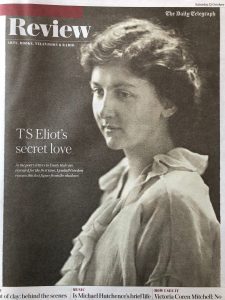 In a feature-length article in the Daily Telegraph, Lyndall Gordon explores the relationship between TS Eliot and Emily Hale. The article coincides with the 50th anniversary of Emily Hale’s death; this permits Princeton to unseal the letters which she received from Eliot, and begin preparations for their unveiling in January.
In a feature-length article in the Daily Telegraph, Lyndall Gordon explores the relationship between TS Eliot and Emily Hale. The article coincides with the 50th anniversary of Emily Hale’s death; this permits Princeton to unseal the letters which she received from Eliot, and begin preparations for their unveiling in January.
Emily Hale told a friend that “[Eliot] loves me – I believe that wholly – but apparently not in the way usual to men less gifted.”
“She seems,” writes Gordon, “to have provided an ideal of pure love, sustained over many years, at first in memory, then in person.”
Gordon’s article outlines the history of their relationship, its appearances in Eliot’s poetry, and the significance of the letters themselves. (Scroll down to July 2019 for our earlier coverage of the unsealing and future publication of the Hale letters.)
Gordon, who is at work on a forthcoming book Eliot Among The Women, will be present when the letters are released. “I will be there in January,” she says, “to fulfil my belief that Eliot’s secret attachment to Hale is central to understanding him.”
———————————————————————————————————-
Hannah Sullivan to give Annual TS Eliot Lecture 2019, October 2019
 We are delighted to announce that The Annual TS Eliot Lecture 2019 will be given in Oxford on Thursday 28th November by Hannah Sullivan.
We are delighted to announce that The Annual TS Eliot Lecture 2019 will be given in Oxford on Thursday 28th November by Hannah Sullivan.
Her title is TS Eliot and the Art of Abandonment.
Dr Hannah Sullivan is Associate Professor and Tutorial Fellow at New College, Oxford. Her Account of TS Eliot’s Poetic Development is published online by the TS Eliot Foundation.
Her first book, The Work of Revision, explored the complicated genesis of some of the major works of English-language modernism, including poetry by Eliot. In 2013, she was awarded a Philip Leverhulme Prize to write a second book on ‘free verse’ – “a strange, straightforwardly oxymoronic, historically unstable phrase that, nevertheless, is almost the only way we have of describing modern poetic form.”
She is equally well known as winner of the TS Eliot Prize for Three Poems, her acclaimed 2018 debut collection of poetry, described by the Chair of the judges as “an astonishing debut, challenging the parameters of what poetry can do”.
This is the first time that the Annual TS Eliot Lecture 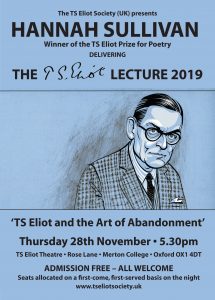 has been given in Oxford. Hosted at the TS Eliot Theatre in Merton College, and with a welcome from Professor Helen Small, Merton Professor of English Language and Literature, doors (on the Rose Lane entrance) will open at 5pm; admission is free on a first-come, first-served basis, and the event will begin at 5.30pm.
has been given in Oxford. Hosted at the TS Eliot Theatre in Merton College, and with a welcome from Professor Helen Small, Merton Professor of English Language and Literature, doors (on the Rose Lane entrance) will open at 5pm; admission is free on a first-come, first-served basis, and the event will begin at 5.30pm.
Members of the TS Eliot Society (UK) are able to reserve seats for the event; see the Members Area for details.
———————————————————————————————————-
A Practical Possum, October 2019
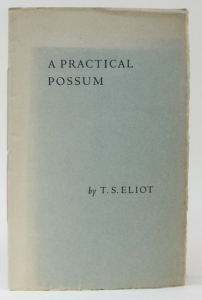 Privately printed and circulated in 1947, an extremely rare copy of A Practical Possum is for sale.
Privately printed and circulated in 1947, an extremely rare copy of A Practical Possum is for sale.
The single poem, described as “one of Mr Eliot’s ‘occasional verse effusions'”, was written to Alison Tandy, one of the child dedicatees of Old Possum’s Book of Practical Cats, in thanks for the gift of a lavender bag.
Eliot gave permission for the Printing and Graphic Arts Department of Harvard Library, which already held the manuscript, to print “a few copies for private circulation solely”. However, he objected when he found that they had printed 80 copies. which, he felt, “very considerably exceeded my licence”. Eliot was given a list of the recipients; 20 copies were retrieved, and only 4 have come to market in the last 40 years.
Details of the pamphlet can be seen at Lucius Books of York; the poem itself can be read in The Poems I 299, with its publishing history and commentary at I 1202.
———————————————————————————————————-
Rare editions of TS Eliot, September 2019
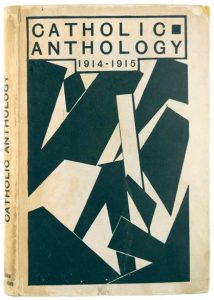 A rare copy of Catholic Anthology, which contained five poems by Eliot, and constituted his first apperarance in book form, is included in the latest Modernisms catalogue from Blackwell’s Rare Books. Edited by Ezra Pound, only 500 copies were published in 1915.
A rare copy of Catholic Anthology, which contained five poems by Eliot, and constituted his first apperarance in book form, is included in the latest Modernisms catalogue from Blackwell’s Rare Books. Edited by Ezra Pound, only 500 copies were published in 1915.
The catalogue also contains rare editions of Murder In The Cathedral; a signed presentation copy of The Idea of a Christian Society; and four books from the library of Bernard Bergonzi, including his annotated Four Quartets.
There are rarities in the catalogue from other authors including Beckett, Conrad, Fitzgerald, Forster and Joyce. The catalogue can be downloaded as a PDF here or a printed copy can be requested by e-mailing Henry.Gott@blackwell.co.uk
In addition, although not in the catalogue, Blackwell’s have a unique copy 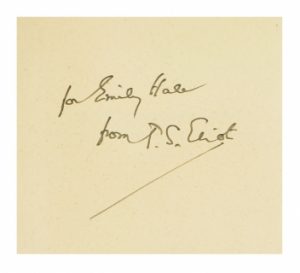 of a 1930 collection of essays, The Eighteen-Eighties, to which Eliot contributed his essay on Pater. The book is inscribed “for Emily Hale from T.S. Eliot”, and also carries her own ownership inscription. The book can be seen here.
of a 1930 collection of essays, The Eighteen-Eighties, to which Eliot contributed his essay on Pater. The book is inscribed “for Emily Hale from T.S. Eliot”, and also carries her own ownership inscription. The book can be seen here.
———————————————————————————————————-
TS Eliot’s rejection letters, September 2019
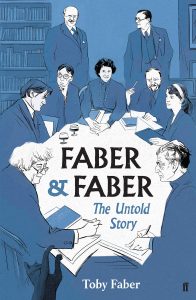 In an article on Literary Hub adapted from his book, Faber & Faber: The Untold Story, author Toby Faber looks at the publishing house’s most infamous rejection letters – including some written by TS Eliot.
In an article on Literary Hub adapted from his book, Faber & Faber: The Untold Story, author Toby Faber looks at the publishing house’s most infamous rejection letters – including some written by TS Eliot.
Rejection letters by Eliot include those of Auden, Joyce and Orwell, while Faber almost turned down William Golding, and rejected Paddington Bear.
———————————————————————————————————-
The Complete Prose of TS Eliot – completed, September 2019
 Johns Hopkins Press have advertised the publication of the final two volumes in The Complete Prose of TS Eliot.
Johns Hopkins Press have advertised the publication of the final two volumes in The Complete Prose of TS Eliot.
Volume 7 is A European Society: 1947–1953, covering “one of the richest and most rewarding periods of Eliot’s career. Following receipt of the Nobel Prize for Literature in 1948, he was in constant demand to lecture, broadcast, contribute to periodicals, and receive honorary degrees and recognition from numerous European, American, and British universities and societies.”
The final Volume 8, Still and Still Moving: 1954–1965, encompasses “the last decade of his monumental career with no lack of energy in pursuing his dramatic and critical writing, completing his final play, and publishing a versatile sequence of canonical essays”.
This colossal project has been completed under the overall editorship of Professor Ronald Schuchard, who was handed the responsibility by Valerie Eliot in 2004. The fully searchable, integrative eight-volume edition now includes all of Eliot’s collected essays, reviews, lectures, commentaries from The Criterion, and letters to editors, including more than 700 uncollected and 150 unpublished pieces from 1905 to 1965.
All eight volumes of The Complete Prose, its access details and a video introduction featuring Professor Schuchard are here.
———————————————————————————————————-
TS Eliot, Crime Fiction Critic, September 2019
 An essay has surfaced on the US website CrimeReads, exploring TS Eliot’s writings on detective novels, and listing his favourite authors.
An essay has surfaced on the US website CrimeReads, exploring TS Eliot’s writings on detective novels, and listing his favourite authors.
Although Eliot’s admiration for Wilkie Collins’ The Moonstone is well known, he reviewed 34 mystery novels and short story collections, as well as two works on true crime, in The Criterion between 1927 and 1929. He also wrote a set of “rules of detective conduct”.
“TS Eliot’s mystery criticism in The Criterion reveals the great writer as a representative twenties detective fiction fan,” writes Curtis Evans, “one still amused with and mentally stimulated by the ingenuity of the puzzles crime authors were devising.
“Like a kind of highbrow pope he lent detective fiction, at a crucial time in its development as an art form, the considerable cachet of his intellectual benediction.”
———————————————————————————————————-
TS Eliot and Boredom, August 2019
A fascinating essay by Christopher McVey, 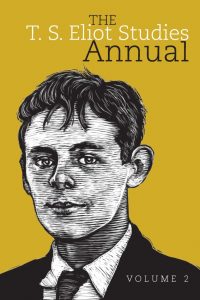 TS Eliot, Modernism, and Boredom, has been made available here. The essay is one of those published in The TS Eliot Studies Annual, Vol 2.
TS Eliot, Modernism, and Boredom, has been made available here. The essay is one of those published in The TS Eliot Studies Annual, Vol 2.
Drawing a contrast with modernism’s “affinity for novelty”, Dr McVey, of Boston University, argues that at the center of much modernist writing in general, and of Eliot’s writing in particular, lies the affect of boredom. He writes that “Whether measuring out one’s life in coffee spoons or pressing lidless eyes while waiting for a closed car and a knock upon the door, Eliot’s work consistently registers the deeply affective and existential experience engendered by boredom.” McVey argues that “these scenes of boredom vibrate with their own coded longing for connection”.
The essay is taken from the The TS Eliot Studies Annual, Vol 2. Launched under John D Morgenstern in 2017, the Annual “strives to be the leading venue for the critical reassessment of Eliot’s life and work”. Members are reminded of the generous 50% discount on the cover price to which they are entitled; see the Members Area for details.
———————————————————————————————————-
Exchanges, our Society quarterly, August 2019

The Summer issue of our Society quarterly has now been published, and is being made available to the public for the first time.
There are articles on Ty Glyn Aeron, the house in Wales where Eliot spent summer holidays; and on the new, commemorative edition of Four Quartets. A Sixth Form student writes about an engaging approach to teaching Eliot at A-Level; and there are reports from this year’s Annual TS Eliot Festival at Little Gidding, and on an evening of Eliot and Beethoven.
You can read and download the new issue of Exchanges here.
———————————————————————————————————-
When Tom met Groucho, August 2019
 In the US version of the Spectator, Christopher Sandford recounts again the unexpected relationship between TS Eliot and Groucho Marx. An exchange of letters and photographs led to an awkward meeting between the two men over dinner.
In the US version of the Spectator, Christopher Sandford recounts again the unexpected relationship between TS Eliot and Groucho Marx. An exchange of letters and photographs led to an awkward meeting between the two men over dinner.
A longer article investigating their “fraught friendship” was published in The New Yorker in 2014. A letter from Groucho to Gummo Marx, describing their dinner, is here. And on our Miscellany page can be found a link to an audio recording of Groucho Marx’s tribute at the Homage to TS Eliot staged after his death.
———————————————————————————————————-
Hannah Sullivan traces TS Eliot’s poetic development, July 2019
 In an essay published by the TS Eliot Foundation, Dr Hannah Sullivan presents an account of TS Eliot’s poetic development, from The Love Song of J Alfred Prufrock to Four Quartets.
In an essay published by the TS Eliot Foundation, Dr Hannah Sullivan presents an account of TS Eliot’s poetic development, from The Love Song of J Alfred Prufrock to Four Quartets.
“More than any other twentieth-century poet,” she writes, “Eliot renders the experience of modernity in all its baffling complexity: the fragments of things we hear, half-hear, remember, or desire, or regret. But the poetry also dramatizes the failure of attempts at understanding this complexity.”
Hannah Sullivan won this year’s TS Eliot Prize for her collection, Three Poems. She is an Associate Professor and Tutorial Fellow at New College, Oxford.
———————————————————————————————————-
TS Eliot “might have enjoyed the rich strangeness” of trailer for the movie Cats, July 2019
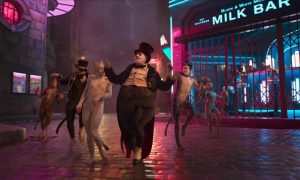 The Eliot Estate has commented following the release of the trailer for the forthcoming movie Cats.
The Eliot Estate has commented following the release of the trailer for the forthcoming movie Cats.
The movie is based upon the musical by Andrew Lloyd Webber, with lyrics drawn from TS Eliot’s Old Possum’s Book of Practical Cats. The Estate has played no direct role in the production of the movie other than “to provide encouragement and enthusiasm”.
The trailer has divided opinion over its human/cat hybrids. But Clare Reihill, who administers the Estate, told The Guardian that “I think Eliot might have enjoyed the rich strangeness of the blurring of the boundary between human and cat in the trailer, which is in keeping with the elusiveness of the world of the poems – or indeed the nocturnal surrealism of something like Rhapsody On A Windy Night.”
———————————————————————————————————-
TS Eliot and The Criterion magazine, July 2019
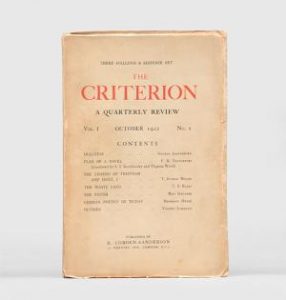 Dr Jason Harding of Durham University has published a fascinating essay on tseliot.com about the history of The Criterion.
Dr Jason Harding of Durham University has published a fascinating essay on tseliot.com about the history of The Criterion.
TS Eliot edited The Criterion magazine for its entire lifespan (1922–1939): the periodical advanced his literary and social career; it was an outlet for his poetry and criticism; and, during the crisis-ridden 1930s, it was a platform for outspoken interventions in the major social and political issues of the day.
The Criterion exerted an influence on contemporary letters out of all proportion to its circulation. Dr Harding’s essay traces its history, its contributors and the literary and social positions which it adopted.
The first issue, dated October 1922, contained the first appearance of The Waste Land, without epigraph or notes. The poem was typeset in proof as two parts, before a last-minute decision saw it appear whole in one issue. Just 600 copies were published, but a rare copy of that Vol 1, No 1, and some of its contents, can currently be seen online at dealers Peter Harrington where it is for sale at £5000.
———————————————————————————————————-
Professor John Haffenden to edit Emily Hale letters, July 2019
It has been confirmed that, as announced at this year’s TS Eliot Festival, Professor John Haffenden, celebrated for his ongoing editing of the Letters of TS Eliot, has been asked by Faber & Faber to edit TS Eliot’s letters to Emily Hale, when they are unsealed in January 2020.
At this stage, further particulars are to be arranged between the Eliot Estate and Princeton University Library, where the 1,131 letters, dating from 1930 to 1956, are sealed within metal security bands. The letters occupy 12 boxes, catalogued as C0686.
Emily Hale was a Boston-born college teacher, who was the poet’s oldest friend, and for decades his confidant and correspondent. The poem Burnt Norton was inspired by a visit with her, and their relationship has been the subject of much speculation.
In 1956, Hale signed a deed of gift, stipulating that her letters from Eliot be kept “completely closed to all readers until the lapse of fifty years after the death of Mr. Eliot or myself, whichever shall occur later. At that time the files may be made available for study by properly qualified scholars in accordance with the regulations of the Library for the use of manuscript materials. To carry out this intention the Library is to keep the collection in sealed containers in its manuscript vaults.”
Proper arrangement of the letters, possible conservation treatment, and other things must be done immediately prior to the official opening on 2 January 2020.
The Manuscripts Division of the Department of Rare Books and Special Collections, who hold the letters within the Princeton University Library, previously published this article about the letters.
UPDATE: It has been confirmed that the intention is to publish the Emily Hale letters as a single volume.
———————————————————————————————————-
How Michael Parkinson walked out of TS Eliot’s Murder In The Cathedral, June 2019
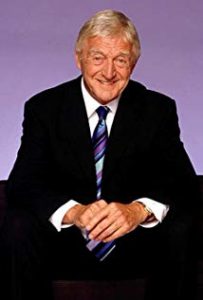 The broadcaster Sir Michael Parkinson has told The Times that the play he once walked out of was TS Eliot’s Murder In The Cathedral.
The broadcaster Sir Michael Parkinson has told The Times that the play he once walked out of was TS Eliot’s Murder In The Cathedral.
“My father, mother and I once went to see Murder In The Cathedral at the Playhouse in Oxford,” he revealed in a My culture fix interview. “My father took us there because he thought it was written by Agatha Christie.
“When we got there, there were all these monks chanting and things like that, so we left rather hurriedly.”
———————————————————————————————————-
The Journal of the TS Eliot Society 2019 edition published, June 2019
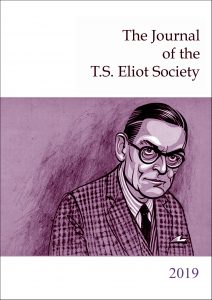 The 2019 edition of the academic Journal of the TS Eliot Society has just been published.
The 2019 edition of the academic Journal of the TS Eliot Society has just been published.
Edited by Dr Scott Freer, the 2019 edition contains essays by William Myers and Benedict Jones-Williams; interviews with artists Mat Collishaw and Julian Peters by Scott Freer; and book reviews by Jaron Murphy. Full details of the contents and ordering details are on the dedicated Journal page via the menu above.
Members of the Society are entitled to a free copy of the Journal; further details on the Journal page.
———————————————————————————————————-
Valerie Eliot on The Waste Land, June 2019
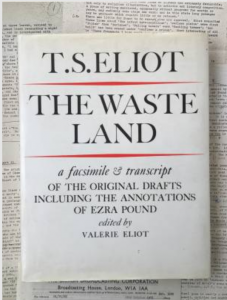 Unique material has surfaced from a BBC radio talk given by Valerie Eliot about The Waste Land, following the publication of her edition of its drafts and manuscripts.
Unique material has surfaced from a BBC radio talk given by Valerie Eliot about The Waste Land, following the publication of her edition of its drafts and manuscripts.
A few days before publication in 1971, Mrs Eliot recorded a four page typed talk with the help of two actors. “Mrs Eliot arrived with one copy of her talk and several copies of the book,” remembered one of those, Hugh Dickson. “Afterwards she gave us our copies, which she autographed and corrected in her own hand two or three misprints.’
Along with Dickson’s book, a copy of the talk itself is also for sale. It is described as “A dispassionate, detailed analysis of the draft of Eliot’s poem, section by section, dealing with Pound’s emendations, Vivien Eliot’s commentary and Eliot’s responses to their interventions in this previously mislaid manuscript. Valerie Eliot is quite definite in her explanation and sometimes with trenchant commentary on some of Pound’s interventions.”
Further details are here, where the View More Images link enlarges a section of the talk dealing with sections IV and V of the poem.
———————————————————————————————————-
TS Eliot and the British Council, June 2019
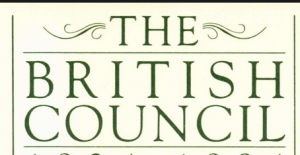 A new article on the TS Eliot Foundation website explores the work which Eliot did for the British Council, during and just after the Second World War.
A new article on the TS Eliot Foundation website explores the work which Eliot did for the British Council, during and just after the Second World War.
Described as “cultural warfare”, Eliot undertook lectures for the Council in Stockholm, Paris and Rome, with other trips planned but cancelled as the War progressed. While some of the lectures appeared in other forms, some have been published for the first time in The Complete Prose of TS Eliot.
Eliot summed up his experience of touring with the British Council following his trip to Rome: “I feel like Sherlock Holmes, who summarised his history since last seeing Watson by saying ‘I then passed through Persia, looked in at Mecca, and paid a short but interesting visit to the Khalifa at Khartoum, the results of which I have communicated to the Foreign Office’.”
———————————————————————————————————-
Rare TS Eliot books at Firsts, London’s Rare Book Fair, June 2019
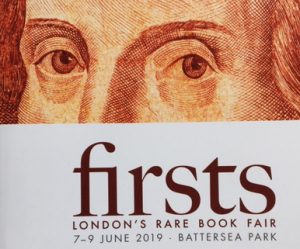 Some fascinating TS Eliot books could be seen at Firsts, London’s Rare Book Fair from June 7th-9th.
Some fascinating TS Eliot books could be seen at Firsts, London’s Rare Book Fair from June 7th-9th.
Neil Pearson Rare Books (Stand P08) had the copy of TS Eliot’s Poetry and Drama previously owned by the great Eliot academic Nevill Coghill , a First Edition with Coghill’s ownership signature at Exeter College, Oxford on the front free endpaper (£150).
Peter Harrington (Stand J07) had a Hogarth Press First Edition of The Waste Land (£7,500).
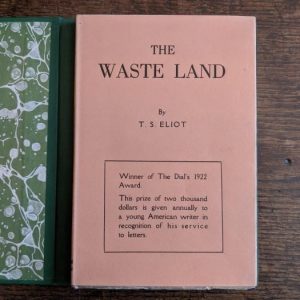 And RA Gekokski Booksellers (stand Q01) not only had a copy of Ara Vos Prec, the 1919 Ovid Press collection of Eliot’s poems with its title famously mispelled by Eliot (£1500) – but they also had an “absolutely exceptional” copy of the First Edition, First Issue of The Waste Land, printed in 1922 by Boni & Liveright. This book (left), rarely seen in this condition, was priced at £85,000.
And RA Gekokski Booksellers (stand Q01) not only had a copy of Ara Vos Prec, the 1919 Ovid Press collection of Eliot’s poems with its title famously mispelled by Eliot (£1500) – but they also had an “absolutely exceptional” copy of the First Edition, First Issue of The Waste Land, printed in 1922 by Boni & Liveright. This book (left), rarely seen in this condition, was priced at £85,000.
———————————————————————————————————-
Rory Stewart MP quotes TS Eliot to reflect this moment in British politics, June 2019
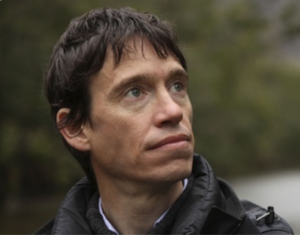 The International Development Secretary and Conservative leadership candidate, Rory Stewart MP, has drawn upon TS Eliot’s Little Gidding in order to consider the current political situation in the UK.
The International Development Secretary and Conservative leadership candidate, Rory Stewart MP, has drawn upon TS Eliot’s Little Gidding in order to consider the current political situation in the UK.
“It speaks to me about what we owe to tradition and what we owe to the dead and what we take forward for the living,” he says in an interview for Politico.
Stewart is said to have memorised all of Four Quartets while walking alone in the Himalayas.
“It’s very alive to how much we owe to the past,” he continues. “It doesn’t attempt to cut us off from who we were, nor to cut us off from the neighbours that surround us.”
———————————————————————————————————-
Signed passport photograph of TS Eliot up for sale, May 2019
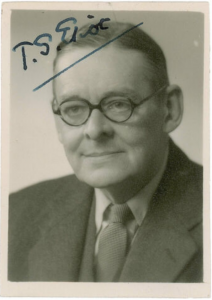 A passport photograph of TS Eliot, signed by him across a corner, has been put up for sale.
A passport photograph of TS Eliot, signed by him across a corner, has been put up for sale.
An accompanying secretary’s letter, dated May 1956, suggests that the photo was sent to a savings bank in Iowa, perhaps as proof of identity.
The photo, the accompanying letter and its original mailing envelope are on sale on Ebay here, for approximately £1200 including shipping.
———————————————————————————————————-
Barbican publishes background material for staging of Four Quartets, May 2019
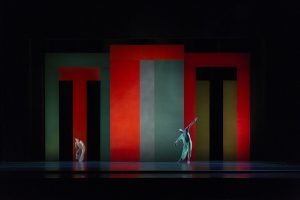 To support this week’s staging of the dance work Four Quartets, the Barbican has published material online about the four poems and their locations, incorporating for a limited period readings of extracts by Ted Hughes and Ralph Fiennes.
To support this week’s staging of the dance work Four Quartets, the Barbican has published material online about the four poems and their locations, incorporating for a limited period readings of extracts by Ted Hughes and Ralph Fiennes.
Professor Denis Donoghue introduces the poems, and Gideon Lester, Artistic Director of Fisher Center at Bard, visits and describes their locations, with some rich colour photography. (His visits can be accessed individually through their page’s top menu bar.) For a limited period there are recordings of extracts from Burnt Norton and East Coker by the poet Ted Hughes, and from The Dry Salvages and Little Gidding by the actor Ralph Fiennes.
The material can be accessed here and remaining tickets for the performances are available here .
For reviews of the work, see the entry on the Events page, April 2019.
———————————————————————————————————-
New anniversary edition of TS Eliot’s Four Quartets, May 2019
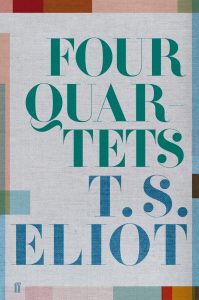 To mark the seventy-fifth anniversary of its first publication in the UK, Faber & Faber are publishing a new hardback edition of Four Quartets.
To mark the seventy-fifth anniversary of its first publication in the UK, Faber & Faber are publishing a new hardback edition of Four Quartets.
This new edition is based upon the limited edition, signed by Eliot, which was printed in 1960 by Giovanni Mardersteig on the hand-press of the Officina Bodoni in Verona. The poems are set in the Dante typeface, which Mardersteig created in the 1950s from fifteenth-century designs.
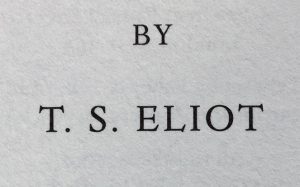
This setting matches Faber’s 2015 edition of The Waste Land (although the cover designs of the two books are of different styles). But unlike that publication, which took its text from Ricks and McCue’s The Poems, the new edition of Four Quartets takes its text from Collected Poems 1909–1962.
After appearing separately between 1936 and 1942, the first UK edition of all Four Quartets in a single volume was published in 1944. The new edition is scheduled for publication this Thursday 16th May.
———————————————————————————————————-
History of Faber & Faber features TS Eliot as publisher, May 2019
 A history of Faber & Faber, by Toby Faber, grandson of its founder Geoffrey Faber, brings together previously unseen letters and documents, and provides some fascinating insights into TS Eliot’s career as a publisher.
A history of Faber & Faber, by Toby Faber, grandson of its founder Geoffrey Faber, brings together previously unseen letters and documents, and provides some fascinating insights into TS Eliot’s career as a publisher.
Faber & Faber: The Untold Story (Faber) traces the history of the publishing house, from its beginnings as Faber & Gwyer in 1924. The following year, a mutual friend introduced Geoffrey Faber to TS Eliot; the company bought up The Criterion, the influential literary magazine which Eliot edited, and Eliot became a Director of the company, which would also publish his own poetry.
When Geoffrey Faber and Maurice Gwyer parted company in 1929, Eliot’s discerning eye and literary connections were significant in building a list of writers and poets at the subsequent Faber & Faber, from Joyce and Pound to Auden and Larkin. The book contains letters and memos in which Eliot rejects George Orwell, but snaps up Ted Hughes (“I’m inclined to think we ought to take this man now.”), and insights into Eliot as a publisher and as a person appear throughout this broader history of Faber & Faber.
Reviews:
The Observer, Robert McCrum: “Inside this literary Vatican, until his death in 1965, TS Eliot was the supreme pontiff.”– also contains a link to an excerpt from the book
The Spectator, DJ Taylor: “Would Faber & Faber still exist without TS Eliot?”
The Telegraph, Tristram Fane Saunders: “It captures the ups and downs of a company created almost by accident, that would change the course of modern literature.”
The Sunday Times, John Walsh (£): “In a 1978 letter, the Faber chairman Matthew Evans let Andrew Lloyd Webber know that Valerie Eliot “would have no objection” to his setting one of her husband’s cat poems to music, thus handing Faber a lifeline for decades.”
Evening Standard, Claire Harman: “Much of the early shaping of the list was the work of T S Eliot, whose day job as a publisher gets proper attention at last in this amiable history”
Financial Times. Nicholas Clee: “TS Eliot was, despite turning down George Orwell twice, not only the greatest poet of his generation but also a publisher of rare acumen.”
The Scotsman, Roger Cox: “Although Faber was himself a poet of some skill, he evidently struggled to make sense of The Waste Land. “You are obscure you know!” he wrote to Eliot in 1925. “I wonder if you realize how difficult you are? And alternatively I wonder if I am specially stupid.”
The Observer, John Mullan: “Eliot spotted the talents of Marianne Moore and Louis MacNeice (even though the latter had sent his poems without any covering letter or return address).”
The New Yorker, Jonathan Galassi: “There’s a kind of poetic justice in the fact that it’s the work, in more than one sense, of T. S. Eliot that both helped establish the temper of the eccentric entity that is Faber & Faber and has kept it alive for close to a century.”
Members of the Society are invited to a lecture by Toby Faber on ‘A mere ordinary director: TS Eliot as publisher’ – see the Members Area for details.
———————————————————————————————————-
“What that word ‘Eliot’ now means”, April 2019
 In an extensive essay in the London Review of Books, Professor Robert Crawford uses The Letters of T.S. Eliot, Volume VIII: 1936-38 as a starting point.
In an extensive essay in the London Review of Books, Professor Robert Crawford uses The Letters of T.S. Eliot, Volume VIII: 1936-38 as a starting point.
The essay looks in particular at the many ways in which Eliot signed his letters, to explore how “Eliot, so aware of his own family name and lineage, was a connoisseur of unusual names” – and “rather liked to escape, as well as to investigate, aspects of his own identity”.
Professor Crawford writes that “in scope, detail and quality of annotation this edition is utterly remarkable.” For other reviews of this latest volume of Letters, scroll down to January 2019.
———————————————————————————————————-
Delta blues with TS Eliot’s ‘vocals’, March 2019
 A second musical composition has been created by Mårten Thavenius, in his Ballistic Angels project, combining recordings of TS Eliot’s voice with electric guitar and rhythms influenced by the Delta blues.
A second musical composition has been created by Mårten Thavenius, in his Ballistic Angels project, combining recordings of TS Eliot’s voice with electric guitar and rhythms influenced by the Delta blues.
“I have worked hard restoring and expanding the recordings of Eliot,” Mårten explains, “before editing selected samples to make them an integrated part of new music compositions. Editing has been made in detail with every emphasis and vowel to make a new rhythm and intonation that is part of the music.” The result is an extraordinary combination of Eliot’s laconic ‘vocals’ over a powerful and driving backing track.
You can listen to The Dead Land here, alongside Mårten’s earlier composition, The Hollow Men.
———————————————————————————————————-
Recording released of live TS Eliot poetry reading, March 2019
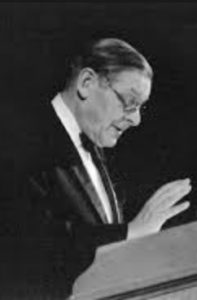 A unique recording has been released of TS Eliot giving a live poetry reading, with his commentary before and between the poems.
A unique recording has been released of TS Eliot giving a live poetry reading, with his commentary before and between the poems.
The recording was made on December 4th 1950, at the 92nd Street Y, New York. Eliot begins his performance with a relaxed and conversational opening. “I discovered when I first began reading my own poems,” he says, “that it is necessary to do a little preamble at the beginning, and to make occasional remarks in between reading the poems or groups of poems. But I want to impress upon you that I realise that nothing that I say in this way – and nothing that I’m saying at the moment – is of the slightest importance.”
Eliot talks to the audience at the outset for over 12 minutes about his poetry, about interpretations of his work, and about the recordings he has made of his poems, before beginning the poetry readings with Preludes, “which show their age to best advantage.”
Other readings include La Figlia Che Piange, two sections of The Waste Land and, unexpectedly, “both parts of the unfinished Coriolan”.
“I know I shall disappoint some people,” he says of one omission, “but I am rather embarrassed by Prufrock. Now I feel it’s rather exposing an adolescent personality.”
Each poem is introduced with comments, and throughout the performance he is relaxed, thoughtful and, in several places, elicits laughter from the audience for his humorous remarks.
The entire 46 minute performance can be heard here.
———————————————————————————————————-
Volume 7 of The Complete Prose of TS Eliot published, March 2019
 The penultimate volume of The Complete Prose of TS Eliot has now been published online.
The penultimate volume of The Complete Prose of TS Eliot has now been published online.
Edited by Iman Javadi and Ronald Schuchard, Volume 7 is entitled A European Society: 1947 – 1953. “The postwar years of this volume represent one of the richest and most rewarding periods of Eliot’s career,” they write. “Following receipt of the Nobel Prize for Literature in 1948, he was in constant demand to lecture, broadcast, contribute to periodicals, and receive honorary degrees and recognition.” This period also saw a film version of Murder in the Cathedral and the publication and production of two new plays, The Cocktail Party and The Confidential Clerk,
“These activities produced a great variety of unpublished, uncollected, and unrecorded addresses, speeches, and tributes, together with ten major literary essays.” Access to the new volume, as with the preceding six, is by institutional or individual subscription, via Project Muse.
The Complete Prose of TS Eliot is due for completion later this year. There has been a Call for Papers for a volume of essays to celebrate the completion; scroll down to January 2019 for details.
———————————————————————————————————-
Fiona Shaw talks of repeat performance of The Waste Land, March 2019
 In an interview for The Observer, Fiona Shaw talked about her original performance of The Waste Land in New York – and the possibility of repeating it.
In an interview for The Observer, Fiona Shaw talked about her original performance of The Waste Land in New York – and the possibility of repeating it.
“When I did The Waste Land in 1995,” she recalls, “it was such an experience. The whole of Manhattan society seemed to come and see this tiny performance of a poem in a disused porno theatre on 42nd Street. Limos pulled up and ladies came in with chihuahuas.”
Asked if she could still recite the poem, she replies: “Most of it’s still in there [taps head]. I was 35 then and I’ve thought about doing it again when I’m 65. I’m holding it tight until the right moment.”
A specially filmed performance of the poem by Fiona Shaw is on The Waste Land app.
———————————————————————————————————-
Screening Prufrock: What the Mermaids Sing, February 2019
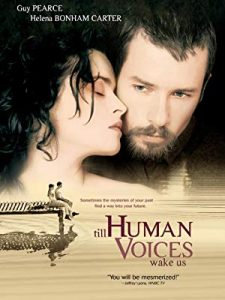 In a new essay, Dr Scott Freer, of the University of Leicester, examines two film adaptations of The Love Song of J. Alfred Prufrock. “The two films give form to Eliot’s ‘dreamy’ poetics,” he writes, “to offer a more optimistic understanding of what the mermaids’ song means.”
In a new essay, Dr Scott Freer, of the University of Leicester, examines two film adaptations of The Love Song of J. Alfred Prufrock. “The two films give form to Eliot’s ‘dreamy’ poetics,” he writes, “to offer a more optimistic understanding of what the mermaids’ song means.”
“These films enter a profound inter-textual dialogue with Eliot’s poem, and so constitute sophisticated examples of the enduring trans-media legacy of probably the most popular poem of the twentieth century.” The essay can be accessed via Oxford Academic Adaptation.
———————————————————————————————————-
Religion and Myth in TS Eliot’s Poetry, February 2019
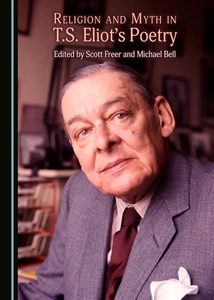 A paperback edition has been published of Religion and Myth in TS Eliot’s Poetry, edited by Dr Scott Freer and Michael Bell.
A paperback edition has been published of Religion and Myth in TS Eliot’s Poetry, edited by Dr Scott Freer and Michael Bell.
The volume presents a rich and powerful range of essays by leading and emerging T.S. Eliot and literary modernist scholars, considering the doctrinal, religious, humanist, mythic and secular aspects of Eliots poetry. A full description and direct purchase is available on Cambridge Scholars Publishing.
———————————————————————————————————-
An Introduction to The TS Eliot Studies Annual, February 2019
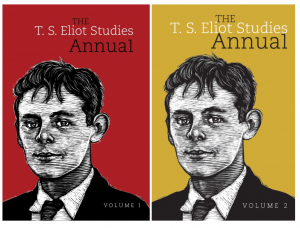 General Editor John D Morgenstern has posted an introduction to The TS Eliot Studies Annual, including an overview of the research that has taken place, and the materials published, over the last half a century.
General Editor John D Morgenstern has posted an introduction to The TS Eliot Studies Annual, including an overview of the research that has taken place, and the materials published, over the last half a century.
“Scholars have now embarked on the decades-long task of coming to terms with more than a million words previously inaccessible or unattributed to Eliot,” he writes. “The T. S. Eliot Studies Annual provides a venue for this ongoing critical reassessment.” His post can be read here.
Members of the TS Eliot Society (UK) are entitled to a 50% discount on The TS Eliot Studies Annual – see the Members Area for details.
———————————————————————————————————-
Two leading poets join TS Eliot Summer School line-up, February 2019
The TS Eliot International Summer School, which takes place in London from July 6th-14th, has added two major figures to its 2019 programme. Both are winners of the TS Eliot Prize for Poetry.
 The poet, novelist, and critic Sean O’Brien will give the inaugural lecture at this year’s summer school on Saturday, July 6th. In addition to his many collections of poetry, his essays, reviews and broadcasting, he was the Weidenfeld Visiting Professor at St Anne’s College, Oxford for 2016-17. He won both the TS Eliot Prize and the Forward Prize in 2007 for The Drowned Book.
The poet, novelist, and critic Sean O’Brien will give the inaugural lecture at this year’s summer school on Saturday, July 6th. In addition to his many collections of poetry, his essays, reviews and broadcasting, he was the Weidenfeld Visiting Professor at St Anne’s College, Oxford for 2016-17. He won both the TS Eliot Prize and the Forward Prize in 2007 for The Drowned Book.
And Hannah Sullivan, winner of the latest TS Eliot Prize for her  acclaimed poetry collection, Three Poems, will give a private reading and book signing as part of the 2019 programme. As an Associate Professor of English at New College, Oxford, Hannah Sullivan lectured during last year’s Summer School.
acclaimed poetry collection, Three Poems, will give a private reading and book signing as part of the 2019 programme. As an Associate Professor of English at New College, Oxford, Hannah Sullivan lectured during last year’s Summer School.
Full details of the 2019 Summer School are here. Members of the TS Eliot Society (UK) are reminded that they can enjoy a 25% discount on Summer School fees – please see the Members Area for details.
———————————————————————————————————-
Inside Eliot House, Massachusetts, January 2019
An article, with photographs by Paul Cary Goldberg. 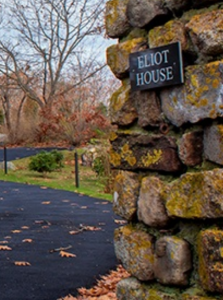 provides a glimpse inside the former Eliot family summer house on Eastern Point, Gloucester, Massachusetts, now converted by the Eliot Foundation into a literary retreat
provides a glimpse inside the former Eliot family summer house on Eastern Point, Gloucester, Massachusetts, now converted by the Eliot Foundation into a literary retreat
The restored property offers somewhere “away from the rush and crush, to spend time in quiet reflection and inspiration, to look out on the same scenes that inspired such a literary giant as Eliot.” The article by Emma Hamilton can be read on The Other Cape.
———————————————————————————————————-
Chelsea flat shared by TS Eliot and John Hayward on the market, January 2019
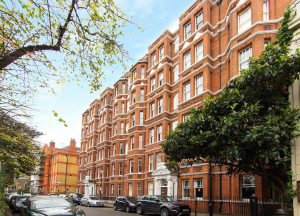 The mansion flat in Carlyle Mansions on Cheyne Walk, Chelsea which TS Eliot shared with John Hayward is on the market for £5 million.
The mansion flat in Carlyle Mansions on Cheyne Walk, Chelsea which TS Eliot shared with John Hayward is on the market for £5 million.
Eliot moved into the flat with Hayward in 1946, and lived there for 11 years until his marriage to Valerie in 1957. Hayward dealt with all visitors, answered the phone and allowed Eliot the privacy he craved.
According to Lyndall Gordon, Hayward had the rooms looking over the Chelsea Embankment, while Eliot “chose two small, dark rooms at the back of the flat, looking down into the well of the building… There, under the crucifix, he observed religious rules, some given, some of his own devising… His life was as emblematic as a tale by Hawthorne: the closed door; the dark well; the game of patience.”
The flat is for sale through Strutt & Parker; details, floorplan and pictures of its current interior are here.
———————————————————————————————————-
The Letters of TS Eliot Volume 8: 1936-1938, January 2019
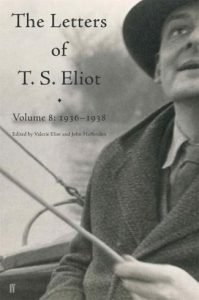 Faber have published Volume 8 of The Letters of TS Eliot, covering the years 1936-1938.
Faber have published Volume 8 of The Letters of TS Eliot, covering the years 1936-1938.
During these years, “Eliot is called upon to become the completely public man.” giving talks, readings and broadcasts, writing The Family Reunion, and also working as an editor and publisher. Correspondents include John Hayward, Virginia Woolf, and the godchildren to whom he sends many of the poems that become Old Possum’s Book of Practical Cats.
The volume covers his separation from first wife Vivien, and tells the full story of the decision taken by her brother Maurice Haigh-Wood, following the best available medical advice, to commit her to an asylum. Some of Vivien’s own letters are included, and one to her brother in August 1938 has already been circulated in which Eliot writes, “In reply to your letter of the 5th instant, so far as my authority is concerned and so far as my authorisation is necessary, I give you my authority to apply for certification of your sister, Mrs T. S. Eliot…”
Edited by the “indefatigable, exemplary” John Haffenden (Evening Standard), the volume has 1152 pages and a cover price of £50. Links to reviews, updated as they appear, are below:
Evening Standard, David Sexton: “Revealing, touching and wise…Taken together, these letters are little less than a lesson in conduct, a demonstration of grace under pressure.”
Observer, Tim Adams: “In some ways it is like eavesdropping on the most maddening of confessionals: just as the poet seems about to mine some inner anxiety, he digresses into bland thank you notes and exhaustive letters to the Church Times on the proceedings of the Anglican synod.”
The Telegraph, Tristram Fane Saunders: “There is something of mild-to-moderate interest on every other page but, collectively, I feel about these letters how Eliot felt about Swinburne’s late poems: yes, many of them are good, ‘But at the same time, it is not necessary to read them, in a world crammed with reading-matter.'”
London Review of Books, Robert Crawford: “In scope, detail and quality of annotation this edition is utterly remarkable.”
Church Times, Richard Harries: “[These letters] also reveal his great clarity as a prose writer, a quality that he urges others to strive for.”
Times Literary Supplement, Stefan Collini: “Readers principally interested in Eliot’s poetry will by this point have grown used to the longueurs of these bulky volumes…Overwhelmingly, what this volume, like the others covering his middle years, gives us are other Eliots – the hard-working publisher, the hands-on journal editor, the supporter of good causes, the frequent diner-out and weekender… the playful friend, the loyal brother, and the tormented husband.”
———————————————————————————————————-
Forthcoming Lyndall Gordon book, Eliot Among the Women, announced, January 2019
 Exploring the impact of the women in TS Eliot’s life on his work, Virago is to publish Eliot Among the Women by the noted Eliot biographer Lyndall Gordon.
Exploring the impact of the women in TS Eliot’s life on his work, Virago is to publish Eliot Among the Women by the noted Eliot biographer Lyndall Gordon.
His relationships with his first wife, Vivienne Haigh Wood, companion Mary Trevelyan, and second wife Valerie Fletcher, as well as his mother, and first publisher Virginia Woolf, will all be explored.
But in particular the book will draw upon the sealed correspondence between Eliot and Emily Hale, due to be opened in January next year. Gordon says that these letters are “central to understanding his most private emotion during the decades when his creativity was at its height”.
Her book is scheduled for publication in 2022, and some further details are here.
———————————————————————————————————-
Call for Papers: Collection of Essays on TS Eliot’s Prose, January 2019
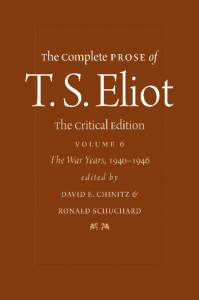 For a proposed volume celebrating the forthcoming completion of The Complete Prose of TS Eliot, co-editors Jayme Stayer and Anthony Cuda are soliciting abstracts for original essays on aspects of Eliot’s work that pertain to his non-fiction prose. The volume will be dedicated to the General Editor of The Prose, Ronald Schuchard, to honor his influence in the fields of Eliot studies and modernism.
For a proposed volume celebrating the forthcoming completion of The Complete Prose of TS Eliot, co-editors Jayme Stayer and Anthony Cuda are soliciting abstracts for original essays on aspects of Eliot’s work that pertain to his non-fiction prose. The volume will be dedicated to the General Editor of The Prose, Ronald Schuchard, to honor his influence in the fields of Eliot studies and modernism.
Essays may fall into the following categories, but are not limited to what is described here:
• original readings of the poems or plays that make use of the less familiar prose as context
• assessments of Eliot’s role as cultural commentator, literary critic, or Christian apologist
• explorations of how Eliot’s prose engages with modernism, culture, politics, theology or contemporary art
• analyses of how newly published pieces or newly annotated pieces shed different light on an aspect of Eliot’s work
• descriptions of an arc or trajectory in Eliot’s thought that is revealed by the chronological presentation of the prose, and/or newly published pieces
• descriptions of a trajectory of an important or newly discovered idea or theme
• stylistic or linguistic analyses of the prose
• discussions of the mutually informing relationships between the new editions of the prose and the letters
• a “guide” or “handbook” approach to a complex or recurrent idea in the prose
Send a 300-word abstract and a brief CV by Apr. 1, 2019 to Jayme Stayer (jayme.stayer(at)gmail.com). Finished essays will be due sometime in early 2020.
———————————————————————————————————-
TS Eliot and Organicism, January 2019
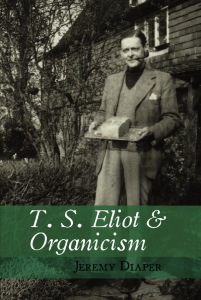 A new book by Dr Jeremy Diaper of the University of Birmingham provides the first comprehensive account of Eliot’s preoccupation with agrarianism, organicism and the environment.
A new book by Dr Jeremy Diaper of the University of Birmingham provides the first comprehensive account of Eliot’s preoccupation with agrarianism, organicism and the environment.
“Jeremy Diaper elucidates and contextualizes several facets of Eliot’s organic thinking, ranging from composting and soil fertility, to regionalism, nutrition and culinary skills. Through detailed examination of Eliot’s engagement with organic issues, this book offers environmental readings of Eliot’s poetry and plays and demonstrates that agrarian concerns emerge as a notable theme in his literary output.”
TS Eliot and Organicism is published by Liverpool University Press and details are here.
Members of the TS Eliot Society UK (who may recall Jeremy Diaper’s essay on this subject in our 2017 Journal) are entitled to a generous 30% discount on the cover price – see the Members’ Area for details.
Review: Times Literary Supplement, Stefan Collini: “Diaper is obviously not wrong to find ambivalent uses of imagery from the natural world in Eliot’s poetry, or extended rehearsals of agrarian themes in his later prose… but a sharper sense of critical proportion would have made his individual insights more persuasive.”
———————————————————————————————————-
Unreal City photobook seeks funding, January 2019
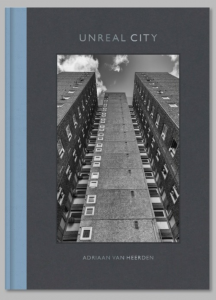 Fine Art photographer Adriaan van Heerden is seeking funding for the publication of Unreal City, 85 photographs taken over 10 years which view London “through the prism” of TS Eliot’s The Waste Land.
Fine Art photographer Adriaan van Heerden is seeking funding for the publication of Unreal City, 85 photographs taken over 10 years which view London “through the prism” of TS Eliot’s The Waste Land.
In an interview in The London Magazine, containing several images from the project, van Heerden explains that “my intention was to view London as it is today through the lens of The Waste Land, although I would have to qualify this by saying that it is my own transmutation of The Waste Land which forms the basis of the juxtaposition, and not an attempt to determine what Eliot’s own visual take might have been…So the pictures are not a straightforward illustration of the text of the poem… but rather a creative transmutation.”
Unreal City has already attracted an endorsement from Bernard O’Donoghue, who is writing an essay for the book. Further details are on the book’s funding page here.

